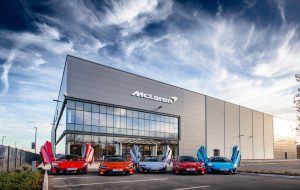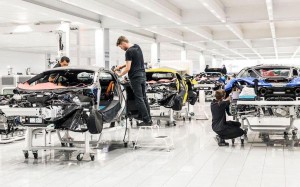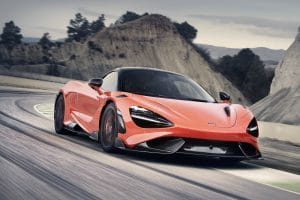
McLaren is examining the potential of synthetic fuel as an alternative to electricity for its future vehicles.
McLaren, the British maker of super cars, is considering the use of synthetic fuel as a replacement for high-octane gasoline.
McLaren COO Jens Ludmann said his company is convinced that synthetic fuel could put a major dent in emissions in an interview with British magazine Autocar.
While the executive doesn’t view the nascent technology as a replacement for electric powertrains, he said the company believes it is a valid alternative, especially considering the environmental impact of producing batteries.
(McLaren taking orders for new supercar.)

The sports car maker is looking to produce a prototype to prove out its potential use of synfuel for future vehicles.
Ludmann said during the interview McLaren is building a prototype that will run on synthetic fuel. In fact, he says that converting a standard internal combustion engine, or at least McLaren’s version of one, wouldn’t even require that much work.
“The technology around synthetic fuels is still being developed, but if you consider that it can be produced using solar energy, easily transported and then pumped [into cars] as we know today, there are potential benefits in terms of emissions and practicality that I’m keen to explore,” he told the British magazine.
“Today’s engines would need only small modifications, and I would like to see this technology get some more airtime,” he added.
(McLaren shows us the light – light weight – with new 765LT.)
Synthetic fuel, or synfuel, is a liquid or gaseous fuel obtained from syngas, a mixture of carbon monoxide and hydrogen, in which the syngas was derived from gasification of solid feedstocks such as coal or biomass even by reforming of natural gas.

McLaren’s newest Long Tail entry is the 765LT. The $375K speedster will hit dealers starting in October.
Ludmann said synthetic fuel represents just one potential alternative to batteries, not their replacement. “I’m not saying this to hold back battery technology but rather to highlight that there could be valid alternatives that we should consider,” he said during the interview.
While synthetic fuel-powered cars would still produce some emissions, Ludmann believes the output would be similar to that produced by an EV over its lifetime, especially when considering the impact of producing a lithium-ion battery.
(McLaren unleashes 804-horsepower Elva.)
Using synthetic-fuel technology with a hybrid system would reduce emissions even further. That’s a good thing, given that McLaren is already preparing to equip all of its cars with hybrid systems by the middle of the decade anyway, Ludmann told Autocar.
